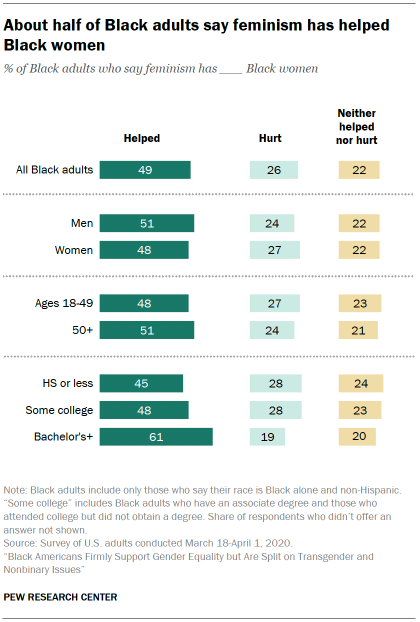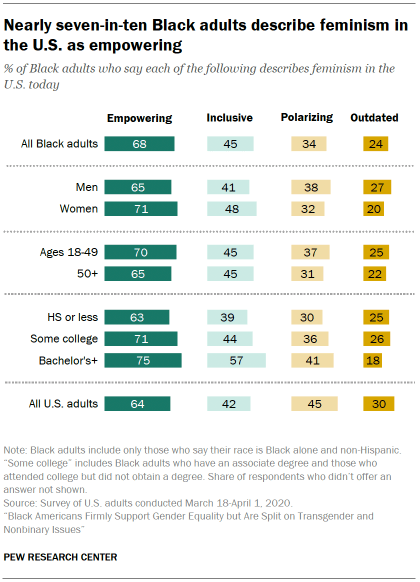The relationship between Black Americans and the U.S. feminist movement has been contentious since the 19th century. Feminist activists such as Susan B. Anthony and Alice Paul racially stereotyped Black men during Reconstruction and kept Black women suffragists at the back of women’s marches in the early 20th century.
In the 1970s, Black women criticized the feminist movement for being narrowly focused on the issues of middle-class White women. Many White feminist activists expressed a desire to work outside the home, one that many Black feminist activists did not share because Black women had historically been a part of the labor force as enslaved workers, farmers and maids. And in an era that saw the codifying of Roe v. Wade, Black women’s fight for reproductive rights extended beyond abortion to advocacy against forced sterilizations.
Since the 1990s, Black Americans’ feminist tensions have often revolved around questions of intraracial harm and betrayal. Anita Hill’s sexual harassment allegation against Clarence Thomas, the women who have made sexual assault claims against hip-hop stars such as R. Kelly and Russell Simmons, and Meredith Watson’s sexual assault claim against former Virginia Lt. Gov. Justin Fairfax are all examples of Black women being positioned as race traitors who are “trying to bring a good brother down.” Indeed, Black Americans’ relationship with feminism is fraught from both external and internal challenges to the movement’s legitimacy.
This chapter draws data on Black adult’s views of feminism from a Pew Research Center survey of U.S. adults conducted in March and April of 2020.5
Black adults say feminism has had a significant impact on women’s rights

Despite this history of tension, about three-quarters of Black adults (76%) say the feminist movement has done a lot to advance women’s rights in the U.S. This includes 28% who say the feminist movement has done a great deal to advance these rights and 48% who say it has done a fair amount. Much smaller shares say the feminist movement hasn’t done much (17%) or anything at all (6%) to advance women’s rights.
While Black adults view feminism as impactful overall, they have different views on the extent to which the movement has helped various groups of women. About half of Black adults (49%) say feminism has helped Black women, either a little (33%) or a lot (16%). About a quarter of Black adults say feminism has hurt Black women (26%), either a little (10%) or a lot (15%). At the same time, 22% of Black adults say feminism has neither helped nor hurt Black women.
Black adults differ on this question primarily by education. Those with a bachelor’s degree (61%) are more likely than those with a high school diploma or less (45%) to say feminism has helped Black women. In contrast, about three-in-ten Black adults with a high school diploma or less or some college education (28% each) say feminism has hurt Black women, while 19% of Black adults with a bachelor’s degree say the same. And Black adults with a high school diploma or less (19%) are more likely than those with a bachelor’s degree (8%) to say feminism has hurt Black women a lot.
Reflecting some of the historical tension described above, Black adults are more likely to say that feminism has had a significant positive impact on White women than on Black women. While 42% of Black adults say feminism has helped White women a lot, a much smaller share say the same about Black women (16%).
When asked specifically about the impact of feminism on their personal lives, about a third of Black women (36%) say feminism has helped them personally, either a little (29%) or a lot (7%). Smaller shares say that feminism has hurt them (13%), either a little or a lot (7% respectively). And half of Black women say feminism has neither helped nor hurt them personally (49%).
How Black Americans describe feminism

When asked how they would describe feminism in the U.S. today, the majority of Black adults say it is “empowering” (68%). This is higher than the shares who describe it as “inclusive” (45%), “polarizing” (34%) or “outdated” (24%).
About seven-in-ten Black women (71%) and 65% of Black men describe feminism as empowering, as do 70% of Black adults 18 to 49 and 65% of Black adults 50 and older.
However, Black adults differ by education on this question. While three-quarters of Black adults with a bachelor’s degree (75%) describe feminism as empowering, a smaller share of Black adults with a high school diploma or less share this view (63%).
Differences by education also appear in other descriptors of feminism. A majority of Black adults with a bachelor’s degree (57%) characterize feminism as inclusive. The same is true of only 39% of Black adults with a high school diploma or less and 44% of those with some college experience. While 41% of Black bachelor’s degree holders describe feminism as polarizing, only 30% of those with a high school diploma or less say the same. And roughly one-in-five Black bachelor’s degree holders (18%) describe feminism as outdated, while about a quarter of Black adults with a high school diploma or less (25%) or some college experience (26%) share this view.
And while Black adults (68%) and the general public (64%) are both most likely to view feminism as empowering, Black adults are less likely than Americans overall to characterize feminism as polarizing (34% vs. 45%) or outdated (24% vs. 30%).
Aside from their descriptions about feminism in the U.S. overall, Black adults were also asked about how well the term describes them personally. About half of Black adults say “feminist” does not describe them (48%), saying it applies either not too well (25%) or not well at all (24%). Roughly a third of Black adults say “feminist” describes them somewhat well (36%). And only 16% say it describes them very well.
Black men (63%) are much more likely than Black women (36%) to say “feminist” does not describe them well. Meanwhile, Black women are more likely than Black men to say that feminism describes them somewhat well (44% vs. 27%) or very well (20% vs. 10%).
And 54% of Black adults with a high school diploma or less say “feminist” does not describe them well, compared with 43% of those with a bachelor’s degree and 44% of those with college experience and no bachelor’s degree.




